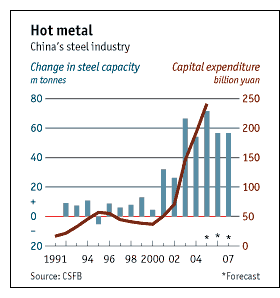

|
| weblog/wEssays | home | |
|
China Irony: Steel, Marx and Monopoly Capital (October 13, 2005)  If I remember my Marx correctly (and I did study the stuff for a year in college under Prof. Frederic Bender),
he predicted that the initial host of competitive manufacturers in any industry would be absorbed by a handful of
larger companies, leading to monopoly capital: a few companies big enough to out-price any competition.
If I remember my Marx correctly (and I did study the stuff for a year in college under Prof. Frederic Bender),
he predicted that the initial host of competitive manufacturers in any industry would be absorbed by a handful of
larger companies, leading to monopoly capital: a few companies big enough to out-price any competition.
But he also predicted that as these few giants faced off in the marketplace, the very size and efficiency which led them to dominate creates excess capacity, sparking a price war which eventually leads to catastrophic losses and the collapse of the industry. Marx was wrong in predicting that these cycles would grow in intensity to the point that capitalism itself would collapse, but he was certainly prescient about the dynamics of monopoly capital, excess capacity and massive losses. In a great irony, the largest quasi-Communist nation on the planet is about to receive a brutal lesson on the dangers of over-capacity. Take a look at the chart and note the parabolic rise in money being poured into steel production in China. As Marx predicted, capital (in this case, capital controlled or abetted by the Central Government banks) will flow into growing industries on the expectation that demand will continue rising forever. But alas, as Karl foresaw, once production exceeds demand, then prices fall rapidly. As demand is satisfied by the tremendous increase in production, demand itself starts falling, leading to a downward spiral of price cuts. To stave off the inevitable, production cuts are avoided until the last minute; then, when losses are too great, it's too late; lowering output has little effect. Here is the situation as reported in The Economist: So far this year the mainland has consumed about a third of world output (of 730m tonnes), and its demand is rising at an annual rate of 20% or so. But China's own production is expanding even faster, by around 30% a year. As a result, China, which last year imported about 15m tonnes, is likely to export as much as it imports this year and may have trade surpluses of 9m tonnes in 2006 and 13m in 2007, reckons Trina Chen, an analyst at CSFB.Here then is a classic case of misallocation of capital to an industry that is already producing more than is needed: China in full economic bloom uses 1/3 of total world production (730 million tons) or about 245 million tons. Yet it has invested in plants which can produce twice that amount: 500 million tons. Can the rest of the world, tottering as it is on the edge of recession, find any reason to buy another 250 million tons of steel? The short answer is a morbid chuckle: the rest of the world's steel producers, having grown fat and happy exporting to China, will now be screaming as tens of millions of tons of cheap steel is dumped into their home markets. Marx must be rolling in his grave, for a Communist government is overseeing the greatest misallocation of capital in world history. It is thus poised to bear the terrible consequences: collapse in the price of all industrial commodities like steel, rabid protectionism of those industries in the developed world and worst of all, massive unemployment and financial ruin as the sector sheds the excess capacity. Readers of this modest blog will recall the evidence supporting the view that a recession will begin next year (or perhaps become visible next year, having started last month). Chinese over-production of steel certainly fits into a picture of enormous financial losses caused by the economic malaise of sagging demand. * * * copyright © 2005 Charles Hugh Smith. All rights reserved in all media. I would be honored if you linked this wEssay to your site, or printed a copy for your own use. * * * |
||
| weblog/wEssays | home |